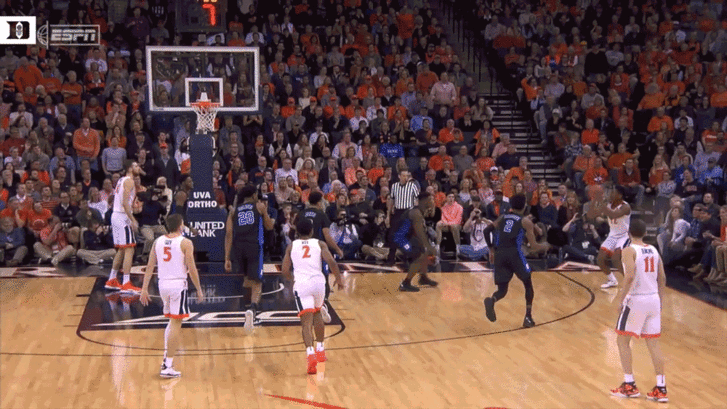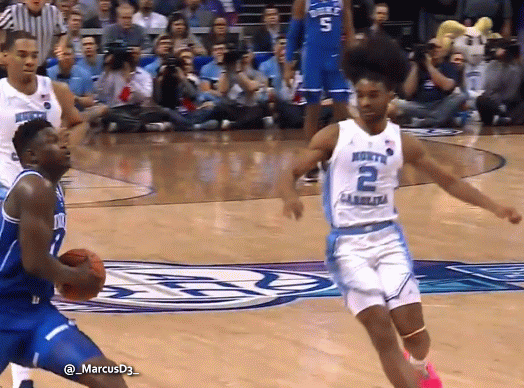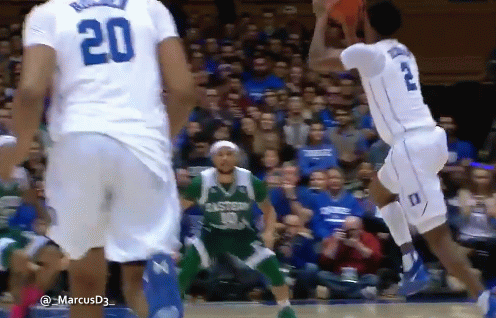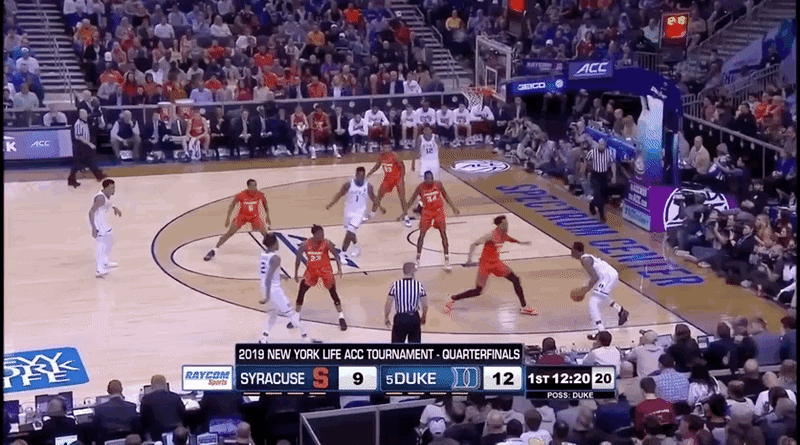It’s time. Zion Williamson is coming to the NCAA tournament. College basketball’s most resounding folk hero in at least a decade is playing in the American sporting event most conducive to folk heroics. Maybe more than a decade? The only comparison I can think of is Steph Curry in 2008. But Curry was an underdog, the only star on a 10-seed from a flyover conference, and he built his legend game by game, spiriting Davidson to within a bucket of the Final Four on what looked like a string of trick shots and miracles. (No one knew it at the time, but it was the future of the NBA.) Williamson, by contrast, arrives at the head of the monstrously talented Duke Blue Devils, the top overall seed and the clear favorite to win the tournament. And his legend is already in place, the result of a seasonlong barrage of GIFs and highlight clips showing a 285-pound 18-year-old who apparently decided the laws of physics were not good enough and wrote better ones.
Williamson is not coming to surprise, in other words. He’s coming to conquer. Which means it’s time to get excited. NCAA men’s basketball has many, many shortcomings; from an ethical standpoint, we should cancel it tomorrow. But dramatically, it was made for this moment—the moment when a young kid with an almost unrecognizably original game shows up; surveys the huckster’s paradise of craggy, pinstriped coaches, slow defenses, and rich kids baying for blood; and says: This is mine.
If there was any doubt that this is Williamson’s message, last week’s ACC tournament just about blasted it into the sun. I mean … did you see him? Coming off an almost six-game absence caused by a knee sprain, the result of his shoe literally ripping apart under the force of his play, Williamson went on a tear that must have had Nike executives clutching their chests and praying to the Winged Victory of Samothrace. We could describe what happened in numerical terms—the 13-for-13 shooting night against Syracuse (to go with 14 rebounds and five assists), the 31 points against North Carolina (also a no. 1 seed in the NCAA tournament, by the way), the all-scorers-leading 21 in the championship game against Florida State, which Duke won—but why bother? It’s so much easier to look back at his season and say Oh:

My:

God:

He:

Did:
This:
There is something so special about this moment that I almost wish we had another week before March Madness started, just to savor it. High-level commercial sports excel at generating can’t-miss, artificially urgent narratives and generally work to convince you that the thing you’re about to watch will be the most epic thing you’ve ever seen (until next week, when it will be even better). That’s not the sense in which I want to appreciate Williamson. The sense in which I want to appreciate Williamson is—well, bear with me for a second, but I keep thinking about LeBron James, and how the disaster in Los Angeles is fundamentally the disaster of a player at the end of his career. Do you know what I mean? It’s a nightmare that’s emerged from a long chain of very grown-up and not very fun causes: LeBron’s desire to set himself up as a Hollywood mogul, a lot of meetings about leveraging crossover markets, the mistaken belief that the Anthony Davis trade could be engineered behind the scenes. I’m not saying you have to be mad at LeBron about any of this stuff; the point is that the Lakers’ implosion is the product of a borderline-middle-aged superstar having acquired the power to manipulate the league at a corporate level and then using that power to overreach himself. It’s an implosion of experience.
Compared to an entangled state of affairs like LeBron’s, Williamson’s story feels utterly, delightfully new. Like France forward Kylian Mbappé after the last World Cup, he’s in the golden hour of his career when he’s captured the world’s attention but still reads as pure potential, and to watch him at this moment feels like an uncomplicated joy. Everything is in front of him. Everything is possible. There’s no history weighing him down. He could do anything, and considering that he’s a person approximately the size and shape of a rhinoceros who moves with an artist’s grace and jumps like an inverted magnet, he really could, you sense, do anything. The NCAA tournament is all but meaningless for his draft stock—the number of non-horrific scenarios in which he isn’t picked first is vanishingly small—but it’s intensely compelling if you’re invested in the joy of watching his story take flight. He could do anything. This the moment when he starts.
In saying all this, I realize I’m skirting the edges of some problematic assumptions about college sports. The idea that it’s inherently purer than the pros, for instance (it isn’t), or that players don’t have an economic stake in the games they play (they do), or that money corrupts sport (it does, but welcome to capitalism). I’m sympathetic to the argument that Williamson should get the hell out of Durham now and not trust his NBA millions to the unlikelihood of another exploding shoe. But I think it’s possible to hate the NCAA while still feeling riveted by the human situations it creates. Williamson isn’t thrilling because he embodies the systemic virtues of the NCAA. It has none. He’s thrilling because watching a spectacular young athlete come into the full possession of their talents is thrilling. The NCAA wants us to associate that drama with its corporate mission statement, which is bullshit, but the fact that it’s bullshit shouldn’t leave us jaded about the drama itself.
NCAA men’s basketball was made for this moment—the moment when a young kid with an almost unrecognizably original game shows up; surveys the huckster’s paradise of craggy, pinstriped coaches, slow defenses, and rich kids baying for blood; and says: This is mine.
There’s at least one sense in which March Madness is an ideal venue for Williamson. For all its emphasis on the John Wooden suite of paternalistic values—discipline, respect for authority, subordination of self to team—college basketball has always been friendly to the more off-kilter hoops geniuses, the knife throwers and card sharks who play basketball in ways that shouldn’t work but do, at least for a little while. The low level of play compared to the NBA and the single-elimination chaos of the tournament combine to elevate all sorts of wispy little Maravichian sharpshooters, beefy Bryant Reeves–ish board-thudders, and hyperconfident Khalid El-Amin types who somehow rattle in gigantic 3-pointers despite shooting with so little arc the balls are still traveling upward at the moment they clang into the net. At its best, this makes for a giddy circus, and the players who thrive in it often accrue a sort of happy, populist, unofficial lore. They’re the players who showed you something new and wild and improbable about basketball, and this was the venue where they briefly seemed to make sense.
Williamson is too good, of course, to be classed entirely with this kind of player. He has a legitimate chance to have a major NBA career, the sort that will make this NCAA tournament a Wiki-page afterthought. But in another sense, he may well be the culmination of this sort of college basketball tradition. Like Curry a decade ago, he’s the player who makes you imagine the physical space of the court differently, who changes your sense of how it can be used. He’s the player who makes you put your hand on the top of your head and look from side to side like did I just see that? He’s the player whose folktales you could imagine being handed down in a world with no sports media—he was 400 pounds if he was an ounce, and he could dunk on a 15-foot rim. In other words, at this moment, he’s both: the someday NBA All-Star, yes, but also the anarchic fever dream of the East regional. College basketball is his game. He’s here to claim it. It’s time.
